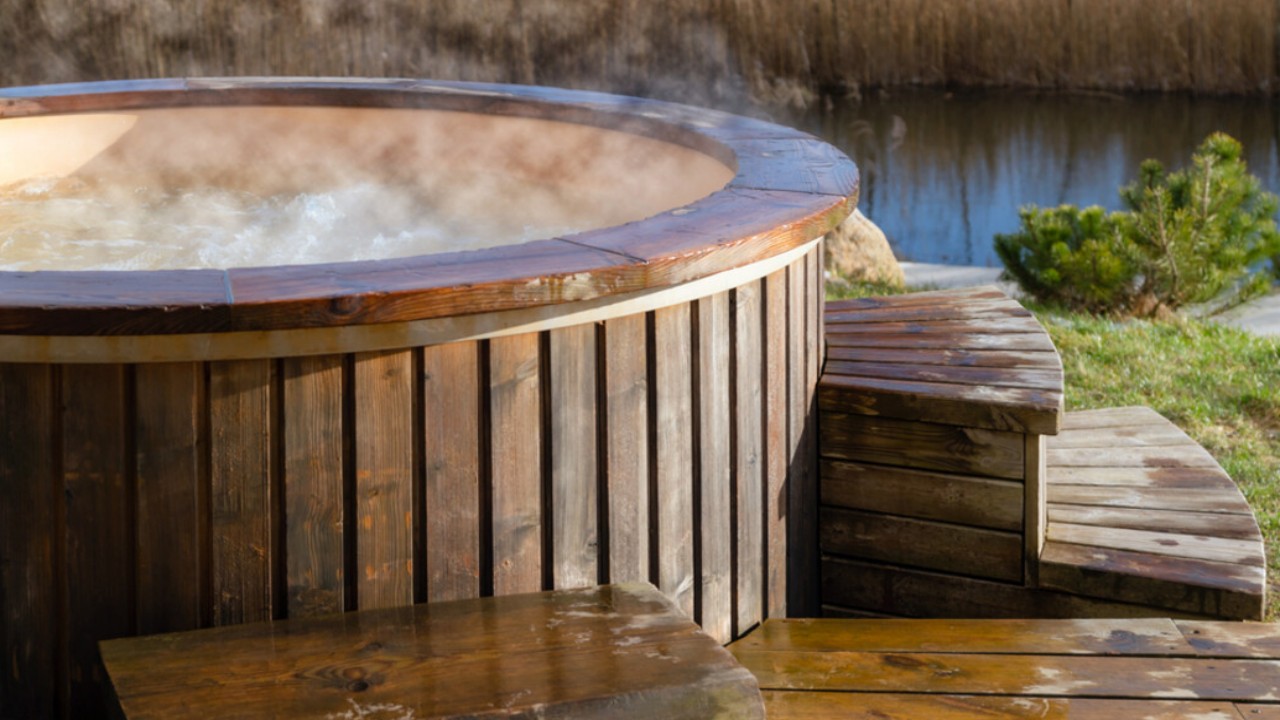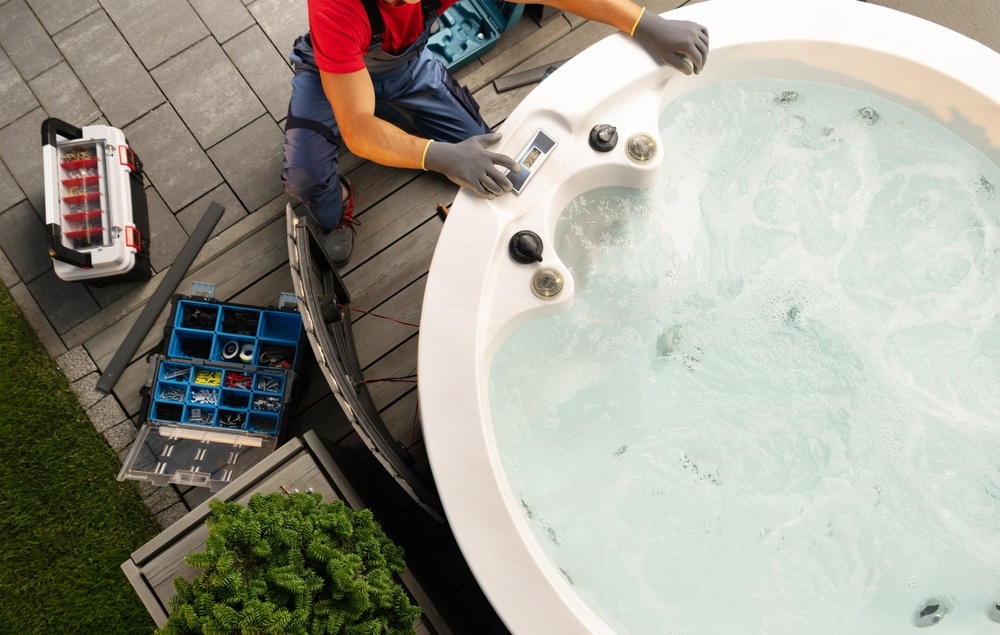Health Benefits of a Hot Tub That You Probably Aren’t Aware About
Take a look at the myriad of health benefits of a hot tub and transform your mundane daily routine into a relaxing, healing, and rejuvenating experience.

Soaking in hot water and giving yourself a nice massage after a long day can surely turn simple self-care into a luxurious spa. The health benefits of a hot tub are an ultimate synergy of relaxation and rejuvenation. From stress reduction and quality sleep to relief from body pain, hot water baths have a lot to offer (1). Whether you are a hot tub enthusiast or you plan to add it to your routine, read on to explore the science behind hydrotherapy, hot tub benefits, and the necessary precautions that you must remember to take to get the best hot tub experience.
What are the Health Benefits of Using a Hot Tub?
A hot tub, also known as a spa or jacuzzi in common parlance, is a standalone unit built for water-based therapy and relaxation. It typically consists of a sizable, heated bathtub filled with water and jets that shoot out pressurized streams of water and bubbles to provide a massaging effect. A hot tub's water is heated to a pleasant temperature, usually between 100 and 104 degrees Fahrenheit (37 and 40 degrees Celsius).
Here is the take of our contributor Dr. Allen Conrad, Doctor of Chiropractic at Montgomery County Chiropractic Center, on the ideal amount of soaking time and the harmful impacts of longer durations spent in a hot tub. He says, “10-15 minutes of soaking in a hot tub is recommended to get the benefits of muscle relaxation. If you stay in too long, you may get dizzy or faint from the exposure to high temperatures. Many people fall or pass out each year from overexposure to a hot tub longer than r
Although hot tubs are mostly used for leisure activities like relaxation, socializing, and enjoyment, they also have several health advantages. The combination of the massaging jets and the warm water helps to relax the body, ease stress, and soothe sore muscles. Furthermore, the buoyancy of the water creates a feeling of weightlessness, which relieves joint aches.
According to Kirk Anderson, Certified Nutritionist & Fitness Coach of Kirk D.A. Anderson Fitness, “The ideal amount of time that one should soak in a hot tub to fully reap its benefits is 15 - 30 minutes. This can be extended up to 45 minutes (e.g. the water has cooled down if it's not constantly heated say in a household bath)”
The health benefits of a hot tub are as follows:
Muscle Recovery after Workouts
Hot tubs are an excellent tool for post-workout muscle recovery. Warm water and massaging jets relax and soothe muscles, reducing post-exercise soreness and stiffness. The heat increases blood circulation, delivering oxygen and nutrients to tired muscles while removing metabolic waste products like pockets of lactic acid. This promotes faster muscle recovery and lowers the likelihood of cramps and injuries (2),(3).
Using a hot tub for muscle soreness can help with muscle flexibility, range of motion, and overall workout performance. It is a revitalizing and rejuvenating way to aid your body's recovery process.
A Stress Buster

The health benefits of hot tubs encompass an important arena of stress and anxiety reduction. Modern urban life is a rat race against time, accommodating work, family, and personal space simultaneously. Striking this delicate balance is stressful—to the extent that it affects physical and mental health.
Soaking in hot water and getting a well-poised massage can be a blissful escape from the daily grind. As the warm water envelops you, it relaxes your muscles and calms your senses. Anxiety and stress melt away as the jets unleash their massaging streams of water. The tranquil setting allows you to disconnect, creating a haven for muscle relaxation and mental rejuvenation. The warmth and rhythmic bubbles add to the bliss. Stress melts away in the tranquil oasis of a hot tub, leaving you feeling renewed and ready to take on the world (1).
Soothes Muscle Pains and Aches
The benefits of hot tub baths for muscle pain, soreness, and cramps have been anecdotal and scientifically proven. Immersing yourself in hot water for just 20 minutes at a temperature of approximately 37°C (the ideal body temperature) dilates your blood vessels, enhancing circulation and providing all the organs, muscles, bones, and skin with adequate oxygen and nourishment. Improved blood circulation helps to remove inflammatory substances from joints, muscles, and tendons.
Hot tubs combine the warm water effect with pulsating jets of water and bubbles that relax tight muscles and release endorphins, which act as natural painkillers. Hot tub hydrotherapy has been shown to improve recovery rates after exercise, reduce fatigue, and alleviate everyday aches and pains (4).
The therapeutic advantages of hot tub therapy have stepped up with the addition of potent massage jets that mimic the techniques used by licensed masseuses. Modern hot tubs can mimic petrissage (kneading, knuckling, and wringing), effleurage (gentle, flowing strokes), and tapotement (rhythmic tapping using the edges of the hands) to provide you with the ultimate spa experience.
Relieves Joint Pains
The health benefits of a hot tub help to increase blood circulation, delivering more oxygen and nutrients to the joints, especially the painful arthritis joints. This soothes the ligaments and tendons and promotes repair. The buoyancy of the water jets and bubbles, reduces the tension in the joints, relieving pressure and allowing for greater mobility. It has a massaging effect that stimulates the release of endorphins, which act as natural pain relievers. The combination of heat, buoyancy, and massage in hot tubs offers a holistic approach to alleviating joint pain and improving joint function (5), (6).
Promotes Better Sleep
A good night’s sleep is the best medicine for most aches and chronic pain. It prepares you physically and mentally for the next day. Sleep is essential for the body to replenish, repair, and grow. Warm water soaking is known to improve blood circulation in all parts of the body, allowing heat dissipation. This is ideal for preparing your body for sleep. The hydrotherapy jets induce a state of relaxation that is conducive to sleep by easing tense muscles and encouraging endorphin release. A sense of tranquility fostered by soaking in hot water is perfect enhancing the sleep quality (7), (8).
Makes Your Skin Glow
Hot tub therapy induces perspiration – this aids in the cleansing and detoxifying of the skin, while also unclogging pores. This process facilitates the elimination of dead skin cells, resulting in a revitalized and renewed appearance. It is a perfect face-steaming alternative that will keep you healthy and make your skin glow.
Studies also discuss the benefits of warm water in curing certain chronic skin issues, by enhancing blood circulation and cleaning the skin pores (9).
Initiates Weight Loss
The benefits of hot tub therapy took a major leap when a study found that soaking in a hot tub burned about the same amount of calories as a 30-minute brisk walk. However, hydrotherapy cannot replace the overall benefits of exercise for weight loss, but it can be a useful ally in the process (10).
The heat from the water increases body temperature, which boosts metabolic rate and calorie burning. The buoyancy of the water also enhances joint mobility, making exercise more comfortable and accessible. Hot tub therapy, combined with a healthy diet and exercise regimen, can contribute to overall weight loss and improved fitness levels.
May Improve Insulin Sensitivity
Few studies have shown a positive relationship between hot tubs and sauna baths for diabetes control.
The warm water and hydrostatic pressure from soaking in hot water may increase blood flow and stimulate heat shock proteins. These proteins are known to enhance insulin signaling and increase the uptake and metabolism of glucose (11). Furthermore, the relaxing and stress-relieving effects of hot tub therapy may indirectly contribute to improved diabetes control. While more research is needed to fully understand the mechanisms, these findings highlight the potential of hot tubs as a complementary treatment for insulin resistance and diabetes.
Good for Heart Health
Passive heat therapy may reduce cardiovascular risk and mortality, particularly in people who struggle to exercise (12).
Research has found that soaking in a hot tub for 10 minutes may lower blood pressure and is likely to be safe for most people with hypertension who are on medication (13). The hot water and the pulsating jets help blood vessels dilate, improving circulation and reducing blood pressure. This dilation also enhances oxygen and nutrient delivery to the heart and reduces tension in the muscles supporting its function.
Relief From Headaches
The benefits of hot tub baths are indispensable when it comes to annoying and persistent headaches (14). A hot tub relieves muscle tension, which is a significant factor in headaches. The buoyancy of the water jets also lessens the pressure on the head and neck region, relieving strain and encouraging relaxation by easing the muscles. Furthermore, the heat improves blood circulation, which can reduce inflammation, and promote the delivery of oxygen and nutrients to the brain, potentially alleviating headache symptoms. For specific advice on how to manage headaches, it is crucial to speak with your physician before attempting hot tub therapy.
It Could be Me-time or Family-time
The hot tub health benefits can eventually improve your mental health and social life.
If you are looking for a peaceful escape and personal relaxation, soaking in a hot tub provides a serene environment to unwind, reflect, and recharge, improving the overall quality of life. It is an opportunity to disconnect from the outside world and focus on self-care. Hot tubs, on the other hand, can also create an inviting space for families to bond and spend quality time together. They provide a unique setting that promotes togetherness and creates lasting memories, whether it is sharing laughter, engaging in meaningful conversations, or simply enjoying each other's company.
Who Should Avoid a Hot Tub Bath?
While the health benefits of a hot tub are innumerable, easily available, and budget-friendly, there are a few precautions and points to keep in mind.
Let us see when you may need to avoid hot tub therapy:
Pregnancy
A pregnant woman should consult her doctor before using a hot tub. An elevated body temperature, especially in the first trimester, can be harmful to a developing fetus. It is recommended to limit hot tub use or lower the water temperature to a safe range under professional supervision (15).
Uncontrolled blood pressure or known heart diseases
The hot water can temporarily raise blood pressure and heart rate. People with heart disease, high blood pressure, or other cardiovascular conditions should speak to their doctor before using a hot tub. They might need to shorten their hot tub sessions or keep a close eye on their blood pressure while they are using it.
Kirk Anderson further says, “Based on research, up to 10 minutes is generally considered a safe amount of time for those with high blood pressure or heart disease to sit in a hot tub.”
Kids
Infants and young children may be more prone to overheating due to their more delicate skin. Children should be exposed to water at a cooler temperature under the supervision of adults.
Skin Sensitivities or Open Wounds

People with skin sensitivities, allergies, or open wounds should use a hot tub with caution. According to a report from the United States, hot tub use adversely affected a considerable number of people after an outbreak began in the tub (16). Inadequate hot tub cleaning creates a moist environment ideal for bacteria growth. Pseudomonas, a kind of bacteria frequently discovered in hot tubs, can cause skin and hair follicle infections (17). Itchy and red bumps on the areas covered by swimwear can appear within a few hours to a few days of exposure.
Conclusion
The bubbly serenity and health benefits of a hot tub can work wonders for your body and mind. It provides a wide range of advantages – from simple stress relief and the alleviation of body aches to more complex functions such as supporting heart health and diabetes management. It is a sanctuary of self-care, an escape from your tiring daily routine, and a healing power for mental and physical issues. You can either take a hot tub bath at a spa or in your own jacuzzi! Modern hot tubs may come equipped with extra features to improve the overall spa experience, including built-in seating, LED lighting, audio systems, aromatherapy options, and waterfalls. You can enjoy them all year round and even in the comfort of your own home. Like with every healthcare service, hot tub therapy should also be done in moderation and under the supervision of a therapist, trainer, or physician.
Contributor: Dr. Allen Conrad, BS, DC, CSCS, and Owner of Montgomery County Chiropractic Center
ALSO READ: 10 Exercises for Outer Thighs to Get Strong and Sculpted Legs





 JOIN OUR WHATSAPP CHANNEL
JOIN OUR WHATSAPP CHANNEL















































































